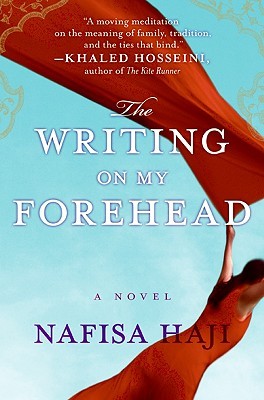Author Nafisa Haji has a story to tell. But it’s a story within a story – the journey she took while she was writing her first novel The Writing on My Forehead – in which she learned about her own identity as she was conveying, through fiction, the perceptions she had of herself.
When I was a child, I remember listening in on my mother and her sisters as they reminisced about their childhoods, interrupting each other frequently to point out details that one or the other of them might have forgotten. Together, right before my eyes, they were writing and editing the history of their family and mine. As I grew older, I understood why they interrupted one another. My brother, sister and I didn’t always remember things the same way. Even specific events we had all experienced together shifted in meaning for each of us. None of us retaining all of the details, we relied on each other to fill in the gaps.
As an adult, I saw the same dynamic play out among married couples recounting their favorite travel anecdotes, or sharing the girl-meets-boy tales of how they met. Again, interruptions were par for the course, sometimes gentle, sometimes downright nagging; though these interruptions sounded rehearsed, as if the details that one spouse remembered to add in were part of the officially authorized script. With more than several years of marriage behind me, I myself became a part of such seemingly scripted dinner party performances of memory.
That is the allure and the danger of storytelling – the solidification of memories, the construction of truths that we agree, together, to believe in. I always wondered about the role of those interruptions and of other details that might have gotten left out of the shared process of remembering. I reflected on the dynamics of story-telling because who we are – as individuals, as family members, as parts of our communities, and as citizens of our nation and the world – is not only a result of the stories we tell, but also the stories and the parts of stories that we don’t recall.
In the aftermath of 9/11, I saw the same process play out on a national scale; some stories were told over and over again so that they became a permanent part of the record of our collective memory, while others were laid aside, forgotten in the shadow of the mass, incomprehensible tragedy unfolding before us. Certain questions, too, were asked over and over again – why? why? – and the answers that eventually emerged as dominant would determine who we became as a nation, but not more so than the other answers, the ones that were submerged and silenced.
After 9/11 the short stories I had been working on were suddenly not enough. I came to regard all stories with a wary suspicion, seeing them as the result of meticulous pruning and weeding. I wondered what had been consciously or unconsciously left out of each story. Then, I found the voice of a character, a young girl, who constantly interrupted the stories her mother instructed her with to tease out inconvenient details which she would grow up to live her life by. Story-telling itself became one of the themes I tried to explore in the novel that would come from that voice. The Writing on My Forehead follows the journey of an Indo-Pakistani Muslim family whose members are scattered after Partition, from India to Pakistan, England and the United States. I traveled back in time though the eyes of the youngest daughter, Saira Qader. Living in America, Saira attempts to understand the tragedies of her family’s present by uncovering the secret and forgotten details of the stories of her family’s past. Saira’s older sister, Ameena, is satisfied with the official, authorized version of their history. Saira is not. By the time she is an adult, Saira herself has become a part of the game, a storyteller/journalist, constructing a history for herself that leaves out important details she would rather not confront.
On one hand, in writing this book, I wanted to tell a story about one family only, without trying to write a commentary on the state of the world. On another, more personal note, I was trying to come to terms with being an American Muslim in post 9/11 America. I used to think I had resolved the question of who I was, a hyphenated American comfortable in my own skin and at ease with the complexity of my heritage. I felt I was neither defined by the past and no longer twisting and contorting my sense of self in order to escape it. Now, that carefully cultivated complexity was being reduced before my very eyes. Stereotypes of Muslims – of Muslim women in particular – were nothing new. But those old caricatures were being imposed with renewed fervor and virulence, forcing me to revisit the old question all over again.
How does the individual quest to define oneself play out in the larger narrative of family history, social development, and political upheaval? What does the individual owe the group and at what cost should the debt be paid? These are universally human questions, played out again and again from one generation to another. In the end, heritage, duty, and the tension between family and individual all came into play when I began writing The Writing on My Forehead.
Nafisa Haji’s first novel, The Writing On My Forehead, was published recently by HarperCollins. She is an American of Indo-Pakistani descent. Born and raised in Los Angeles, she now lives in Northern California with her husband and son. Nafisa is currently working on her second novel.

















